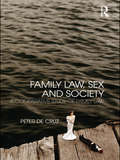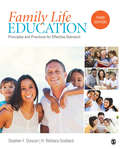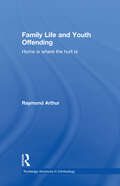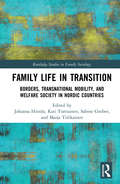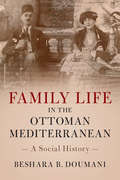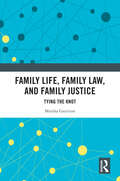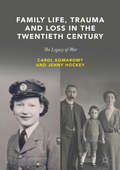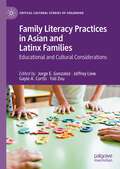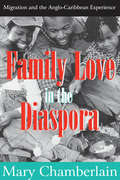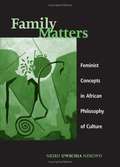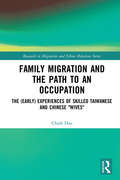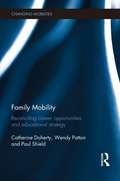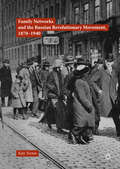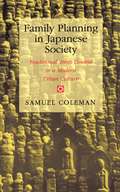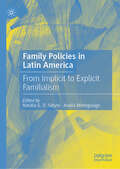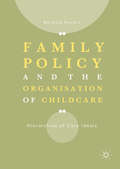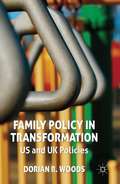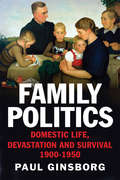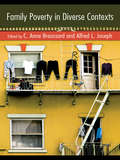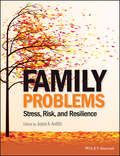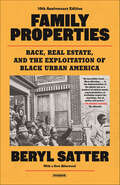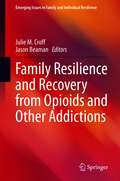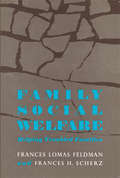- Table View
- List View
Family Law, Sex and Society: A Comparative Study of Family Law
by Peter De CruzComparative in both approach and framework, Family Law, Sex and Society provides a critical exposition of key areas in family law, exploring their evolution and development within their historical, cultural, political and legal context.Cross-referencing to English law throughout, this comparative textbook pays particular attention to the transformation of marriage; the development of divorce laws; matrimonial property; the legal recognition of unmarried heterosexual and same-sex cohabitants; the universal adoption of the best interests standard for children in domestic and international legislation; and the impact of the Human Rights Act 1998 on family law in a variety of jurisdictions.Divided into different sections, Family Law, Sex and Society includes coverage of: a jurisdictional and historical survey of some of the main themes in Family Law, as well as consideration of the evolution of the Western family the English law relating to divorce, marital property and children and a comparison with the equivalent law in the civil law jurisdictions of France and Germany family law developments in other common law countries such as Australia and New Zealand, selected American jurisdictions, parts of Africa and some Far Eastern countries; and hybrid jurisdictions like Japan and Russia an analysis of the law relating to unmarried cohabitation and domestic partnerships in civil law jurisdictions such as France, Germany and Sweden in comparison to Anglo-American law a comparative analysis of the laws relating to domestic violence. Family Law, Sex and Society offers valuable socio-legal and socio-cultural insights into the practice of family law, and is the only textbook that provides a unified, coherent and comparative approach to the study of family law as it operates in these particular jurisdictions.
Family Life Education: Principles and Practices for Effective Outreach
by Stephen (Steve) Duncan H. (Harold) GoddardA practical how-to guide to developing, implementing, evaluating, and sustaining effective family life education programs. Drawing on the best scholarship and their own years of professional experience, the authors of this thoroughly updated Third Edition begin by discussing the foundations of family life education and encourage readers to develop their own outreach philosophies. The book then helps readers learn principles and methods for reaching out to the public and how to form and use community collaborations and use principles of social marketing to promote programs.
Family Life Education: Principles and Practices for Effective Outreach
by Stephen (Steve) Duncan H. (Harold) GoddardA practical how-to guide to developing, implementing, evaluating, and sustaining effective family life education programs. Drawing on the best scholarship and their own years of professional experience, the authors of this thoroughly updated Third Edition begin by discussing the foundations of family life education and encourage readers to develop their own outreach philosophies. The book then helps readers learn principles and methods for reaching out to the public and how to form and use community collaborations and use principles of social marketing to promote programs.
Family Life and Youth Offending: Home is Where the Hurt is (Routledge Advances in Criminology)
by Raymond ArthurThe contention that young people commit offences due to inadequate parenting and parental difficulties has been an abiding feature of the debates on juvenile offending. Previously this evidence has been used to design prevention programmes for young offenders who have been processed by the criminal justice system, but this book examines how this evidence can be used to prevent offending in the first place. Examining the relationship between the causes of youth offending and the legal duty of the state to address those causes, this book provides evidence to show that improving the family environment could be the most effective and enduring strategy for combating juvenile delinquency and associated behavioural, social and emotional problems. It examines how current child welfare legislation, in particular the Children Act 1989, could be employed to prevent children who are at risk of engaging in antisocial and delinquent behaviour from offending. It abandons the traditional ‘welfare vs. justice’ dichotomy and instead outlines a new approach which focuses on the rights and needs of young people in troubled circumstances and their families.
Family Life in Transition: Borders, Transnational Mobility, and Welfare Society in Nordic Countries (Routledge Studies in Family Sociology)
by Marja Tiilikainen Johanna Hiitola Kati Turtiainen Sabine GruberThis volume examines the ways in which bordering practices influence the everyday lives of racialized parents in the changing welfare states of Finland, Denmark, Norway, and Sweden. Focusing on the need to negotiate, adjust, and reconcile family life, parenthood and parenting practices in the face of national, material, ideological, cultural, religious, and moral borders, it considers the manner in which these processes are complicated by recent changes in the legitimation of Nordic welfare states. The case studies centre on migrant, refugee, and asylum seeker parents, as well as parents of the indigenous Sámi communities. The book considers the ways in which the welfare state and its services construct borders of respectable parenthood, and examines the efforts on the part of racialized parents to negotiate such borders and organize their transnational everyday lives. Uncovering possibilities and obstacles that exist for families seeking to enact citizenship in the Nordic welfare states, Family Life in Transition will appeal to social scientists with interests in the sociology of the family, children, parenting, and the welfare state.
Family Life in the Ottoman Mediterranean: A Social History
by Doumani Beshara B.In writings about Islam, women and modernity in the Middle East, family and religion are frequently invoked but rarely historicized. Accessibly written and based on a wide range of local sources, this book shows that there is no such thing as a typical Muslim or Arab family type. Rather, it reveals dramatic differences, even within the same cultural zone, in the ways that family was understood, organized and reproduced. By concentrating on family life in the Ottoman Empire, in particular in what is now Lebanon and Palestine, Beshara B. Doumani skilfully uses examples of family waqf endowments, lawsuits between kin, and other cases from the shari'a courts to reconstruct the stories and priorities of ordinary individuals. Through his examination of the transformations of family, property and gender regimes, Doumani offers a groundbreaking examination of the lives of ordinary people. By doing so, he challenges prevailing assumptions about modern Middle Eastern societies.
Family Life, Family Law, and Family Justice: Tying the Knot
by Marsha GarrisonFamily Life, Family Law, and Family Justice: Tying the Knot combines history, social science, and legal analysis to chart the evolution and interdependence of family life and family law, portray current trends in family life, explain the pressing policy challenges these trends have produced, and analyze the changes in family law that are essential to meeting these challenges. The challenges are large and pressing. Across the industrialized West, nonmarital birth, relational stress, multi-partner fertility, and relationship dissolution have increased, producing a dramatic rise in single parenthood, poverty, and childhood risk. This concentration of familial and economic risk accelerates socioeconomic inequality and retards intergenerational mobility. Although the divide is most pronounced in the United States, the same patterns now affect families throughout the Western world. Across the European Union, there are 9.2 million "lone" parents, and just under half of their families live in poverty. Tying the Knot demonstrates how today’s family patterns are deeply rooted in long-standing, class-based differences in family life and explains why these class-based differences have accelerated. It explains how the values that guide family law development inevitably reflect the world in which families live and develops a new family law capable of meeting the needs of twenty-first century families. The book will be of considerable interest to family specialists from a number of fields, including law, demography, economics, history, political science, public health, social policy, and sociology.
Family Life, Trauma and Loss in the Twentieth Century: The Legacy Of War
by Carol Komaromy Jenny HockeyThis book uses personal memoir to examine links between private trauma and the socio-cultural approach to death and memory developed within Death Studies. The authors, two key Death Studies scholars, tell the stories that constitute their family lives. Each bears witness to the experiences of men who were either killed or traumatised during World War One and World War Two and shows the ongoing implications of these events for those left behind. The book illustrates how the rich oral history and material culture legacy bequeathed by these wars raises issues for everyone alive today. Belonging to a generation who grew up in the shadow of war, Komaromy and Hockey ask how we can best convey unimaginable events to later generations, and what practical, moral and ethical demands this brings. Family Life, Trauma and Loss in the Twentieth Century will be of interest to students and scholars across a range of disciplines including Death Studies, Military History, Research Methods, Family History, the Sociology of the Family and Life Writing.
Family Literacy Practices in Asian and Latinx Families: Educational and Cultural Considerations (Critical Cultural Studies of Childhood)
by Jeffrey Liew Gayle A. Curtis Yali Zou Jorge E. GonzalezThis book focuses on the literacy beliefs and practices of parents and children from Asian and Latinx heritage backgrounds. In the US, children from Asian and Latinx immigrant backgrounds represent the largest population of dual language learners in schools. While existing research has paid significant attention to the roles of parenting and the home literacy environment on children's literacy development, relatively little attention has been allocated to immigrant families. Chapters aim to meet the need in the field to understand the roles of culture and immigrant experiences on children's literacy learning and development, including immigrant families' home environments and parents' involvement in literacy-related activities in both English and the parents' native language. As Hispanic/Latinx and Asian American populations grow in the US, this book answers an urgent call for school systems and child and family professionals to be aware of issues in this area and how to address them in culturally responsive ways.
Family Love in the Diaspora: Migration and the Anglo-Caribbean Experience
by Mary ChamberlainColonial social policy in the British West Indies from the nineteenth century onward assumed that black families lacked morals, structure, and men, a void that explained poverty and lack of citizenship. African-Caribbean families appeared as the mirror opposite of the "ideal" family advocated by the white, colonial authorities. Yet contrary to this image, what provided continuity in the period and contributed to survival was in fact the strength of family connections, their inclusivity and support. This study is based on 150 life story narratives across three generations of forty-five families who originated in the former British West Indies. The author focuses on the particular axes of Caribbean peoples from the former British colonies of Jamaica, Trinidad and Tobago and Barbados, and Great Britain. Divided into four parts, the chapters within each present an oral history of migrant African-Caribbean families, demonstrating the varieties, organization, and dynamics of family through their memories and narratives. It traces the evolution of Caribbean life; argues how the family can be seen as the tool that helps transmit and transform historical mentalities; examines the dynamics of family life; and makes comparisons with Indo-Caribbean families. Above all, this is a story of families that evolved, against the odds of slavery and poverty, to form a distinct Creole form, through which much of the social history of the English-speaking Caribbean is refracted. "Family Love in the Diaspora" offers an important new perspective on African-Caribbean families, their history, and the problems they face, for now and the future. It offers a long overdue historical dimension to the debates on Caribbean families.
Family Matters: Feminist Concepts in African Philosophy of Culture
by Nkiru Uwechia NzegwuCharts new trends in gender studies through a compelling analysis of Igbo society.
Family Migration and the Path to an Occupation: The (Early) Experiences of Skilled Taiwanese and Chinese ‘Wives’ (Research in Migration and Ethnic Relations Series)
by Chieh HsuThis book sheds light on the invisible early post-arrival period of female family migrants, traditionally considered to be low skilled or professionally quiescent. With attention to the experiences of Chinese and Taiwanese women married to German men, it examines the ways in which the private sphere—marked by intermarriage couple dynamics and native–foreigner relations—constitutes the main locus of women’s socialization in the host country, as interactions with their intimate partners in the family realm shape both their self-conceptions and their employment intentions. Based on interviews with migrant women and their spouses, the author outlines the subject positions that characterize female migrants’ attitudes to external constructs and entering the labor market, showing that female family migrants frequently take on family migrant and wife roles that permeate intimate relationships and impede employment intentions, but also often strive to realign with their pre-departure independent selves and thus regain agency. A study of gender dynamics and labor market entry among newly arrived female migrants, this volume will appeal to scholars of sociology with interests in gender, migration, and work.
Family Mobility: Reconciling Career Opportunities and Educational Strategy (Changing Mobilities)
by Catherine Doherty Wendy Patton Paul ShieldFamily mobility decisions reveal much about how the public and private realms of social life interact and change. This sociological study explores how contemporary families reconcile individual members’ career and education projects within the family unit over time and space, and unpacks the intersubjective constraints on workforce mobility. This Australian mixed methods study sampled Defence Force families and middle class professional families to illustrate how families’ educational projects are necessarily and deeply implicated in issues of workforce mobility and immobility, in complex ways. Defence families move frequently, often absorbing the stresses of moving through ‘viscous’ institutions as private troubles. In contrast, the selective mobility of middle class professional families and their ‘no go zones’ contribute to the public issue of poorly serviced rural communities. Families with different social, material and vocational resources at their disposal are shown to reflexively weigh the benefits and risks associated with moving differently. The book also explore how priorities shift as children move through educational phases. The families’ narratives offer empirical windows on larger social processes, such as the mobility imperative, the gender imbalance in the family’s intersubjective bargains, labour market credentialism, the social construction of place, and the family’s role in the reproduction of class structure.
Family Networks and the Russian Revolutionary Movement, 1870–1940
by Katy TurtonThis book explores the role played by families in the Russian revolutionary movement and the first decades of the Soviet regime. While revolutionaries were expected to sever all family ties or at the very least put political concerns before personal ones, in practice this was rarely achieved. In the underground, revolutionaries of all stripes, from populists to social-democrats, relied on siblings, spouses, children and parents to help them conduct party tasks, with the appearance of domesticity regularly thwarting police interference. Family networks were also vital when the worst happened and revolutionaries were imprisoned or exiled. After the revolution, these family networks continued to function in the building of the new Soviet regime and amongst the socialist opponents who tried to resist the Bolsheviks. As the Party persecuted its socialist enemies and eventually turned on threats perceived within its ranks, it deliberately included the spouses and relatives of its opponents in an attempt to destroy family networks for good.
Family Planning in Japanese Society: Traditional Birth Control in a Modern Urban Culture
by Samuel ColemanThe book description for the previously published "Family Planning in Japanese Society: Traditional Birth Control in a Modern Urban Culture" is not yet available.
Family Policies in Latin America: From Implicit to Explicit Familialism
by Natália G.D. Sátyro Analía MinteguiagaThis book examines family policies in Latin America. The first half of the book adopts a thematic approach to assess how the concept of &‘family&’ has changed over the last few decades, and how family policies are intrinsically linked to demographic changes, social class, family arrangements and the labour market. The second half of the book provides detailed country case studies in order to analyse family policies in action. Drawing on evidence from Argentina, Bolivia, Brazil, Chile, Costa Rica, Ecuador, El Salvador, Guatemala, Honduras, Mexico, Nicaragua, Panama, Paraguay, and Uruguay, it offers a comprehensive and comparative overview of family policies across the continent, demonstrating the various ways in which they have been impacted by political regimes and governance. The book also compares family policies in Latin America to those in Europe and North America. It will appeal to all those interested in family policy, public policy, development studies and sociology, as well as Latin America more generally.
Family Policy and Disability
by Arie RimmermanThis book explores the status and scope of family policies related to households of children with disabilities, providing an in-depth, evidence-based review of legal, programmatic issues. It includes a discussion of the gaps between family needs and contemporary family policies in the United States and European countries, as demonstrated in these households' surveys. In addition, the volume offers a comparative analysis of cash benefits, tax credits and deductions, and in-kind provisions between the United States and select European countries (UK, France, and Sweden). Most importantly, this book identifies and continues the discussion regarding the critical role of family-centered policies, as expressed in the United Nations Convention on the Rights of Persons with Disabilities (UNCRPD), as well as the future of family policy toward families of children with disabilities at a time of economic crisis.
Family Policy and the Organisation of Childcare: Hierarchies of Care Ideals
by Borbála KovácsThis book explains and theorises the ways in which family policy instruments come to shape the routine care arrangements of young children. Drawing on interviews with close to a hundred parents from very different walks of life in urban and rural Romania, the book provides a rich account of the care arrangement transitions these parents experience during their children’s first five years of life. The influence of family policies emerges as complex and uneven, affecting childcare decisions both directly and indirectly by contributing to the reproduction and legitimation of age-related hierarchies of care ideals. These cultural artefacts, reflective of both longstanding institutional legacies and recent policy innovations between 2006 and 2015, are the prism through which mothers and fathers from diverse backgrounds view and make decisions about their children’s care. This unique volume will be of interest and value to students and scholars of childcare, its organisation and family policy, specifically in post-socialist contexts.
Family Policy in Transformation
by Dorian R. WoodsIn the US and UKthere has been a transformation in child care, family leave, social assistance and tax credits over the last twenty years. This book explores the factors behind these changes. With detailed case studies, it shows that ideas and the power to wield them are crucial factors in the transformation of family policy. "
Family Politics
by Paul GinsborgIn this masterly twentieth-century history, Paul Ginsborg places the family at center stage, a novel perspective from which to examine key moments of revolution and dictatorship. His groundbreaking book spans 1900 to 1950 and encompasses five nation states in the throes of dramatic transition: Russia in revolutionary passage from Empire to Soviet Union; Turkey in transition from Ottoman Empire to modern Republic; Italy, from liberalism to fascism; Spain during the Second Republic and Civil War; and Germany from the failure of the Weimar Republic to the National Socialist state. Ginsborg explores the effects of political upheaval and radical social policies on family life and, in turn, the impact of families on revolutionary change itself. Families, he shows, do not simply experience the effects of political power, but are themselves actors in the historical process. The author brings human and personal elements to the fore with biographical details and individual family histories, along with a fascinating selection of family photographs and portraits. From WWI—an indelible backdrop and imprinting force on the first half of the twentieth century—to post-war dictatorial power and family engineering initiatives, to the conclusion of WWII, this book shines new light on the profound relations among revolution, dictatorship, and family.
Family Poverty in Diverse Contexts
by C. Anne Broussard Alfred L. JosephFamily Poverty in Diverse Contexts addresses the context of poverty in the United States and focuses on poverty issues that family members must confront as they move through the life course. This edited collection provides a unique perspective that draws together macro and micro research about how poverty affects families throughout their lives, increasing risks and reducing opportunities at every stage. Individual chapters emphasize the context of poverty in the United States, then go on to examine specific life cycle stages and what happens when poverty intersects with family concerns. Contributing authors are respected experts in their fields and represent a broad range of disciplines and perspectives including child development, community health, education, family studies, gerontology, disability, public policy, social work and sociology. Family Poverty in Diverse Contexts includes a range of pedagogical features to enhance learning such as exercises and discussions relating to each chapter, which will encourage readers to think critically and apply the knowledge to their own lives. It will interest students, academics and researchers of sociology, family studies, social work and health as well as other related disciplines.
Family Problems: Stress, Risk, and Resilience
by Joyce A. ArdittiFamily Problems: Stress, Risk, and Resilience presents an interdisciplinary collection of original essays that push the boundaries of family science to reflect the increasingly diverse complexity of family concerns in the modern world. Represents the most up-to-date family problem research while addressing such contemporary issues as parental incarceration, same sex marriage, health care disparities, and welfare reform Features brief chapter introductions that provide context and direction to guide the student to the heart of what’s important in the piece that follows Includes critical thinking questions to enhance the utility of the book for classroom use Responds to family problem issues through the lens of a social justice perspective
Family Properties: Race, Real Estate, and the Exploitation of Black Urban America
by Beryl SatterPart family story and part urban history, a landmark investigation of segregation and urban decay in Chicago -- and cities across the nationThe "promised land" for thousands of Southern blacks, postwar Chicago quickly became the most segregated city in the North, the site of the nation's worst ghettos and the target of Martin Luther King Jr.'s first campaign beyond the South. In this powerful book, Beryl Satter identifies the true causes of the city's black slums and the ruin of urban neighborhoods throughout the country: not, as some have argued, black pathology, the culture of poverty, or white flight, but a widespread and institutionalized system of legal and financial exploitation. In Satter's riveting account of a city in crisis, unscrupulous lawyers, slumlords, and speculators are pitched against religious reformers, community organizers, and an impassioned attorney who launched a crusade against the profiteers—the author's father, Mark J. Satter. At the heart of the struggle stand the black migrants who, having left the South with its legacy of sharecropping, suddenly find themselves caught in a new kind of debt peonage. Satter shows the interlocking forces at work in their oppression: the discriminatory practices of the banking industry; the federal policies that created the country's shameful "dual housing market"; the economic anxieties that fueled white violence; and the tempting profits to be made by preying on the city's most vulnerable population. Family Properties: Race, Real Estate, and the Exploitation of Black Urban America is a monumental work of history, this tale of racism and real estate, politics and finance, will forever change our understanding of the forces that transformed urban America. "Gripping . . . This painstaking portrayal of the human costs of financial racism is the most important book yet written on the black freedom struggle in the urban North."—David Garrow, The Washington Post
Family Resilience and Recovery from Opioids and Other Addictions (Emerging Issues in Family and Individual Resilience)
by Julie M. Croff Jason BeamanThe book examines the relationship between family resilience and recovery from substance use disorders. It presents information on etiology of substance use disorders within the family system as well as new research on resilience in addiction recovery. The book facilitates the development of evidence-based resilience practices, programs, and policies for those working or dealing with families and addiction.Key topics addressed include: Protecting workers from opioid misuse and addiction. Neuroscience-informed psychoeducation and training for opioid use disorder. New models for training health care providers. Role of families in recovery capital. Family Resilience and Recovery from Opioids and Other Addictions is a must-have resource for researchers, professors, and graduate students as well as clinicians and related professionals in family studies, public health, and clinical psychology and all interrelated disciplines, including behavioral health, social work, and psychiatry.
Family Social Welfare: Helping Troubled Families
by Frances ScherzOur changing cultural environment and societal attitudes are subtly but unmistakably altering the personality development of the individual and the functioning of the family. The increasing complexity of the emotional and social problems of their clients is requiring social workers to understand and meet the needs of the entire family group as well as of its individual members. Two nationally known experts in the field have collaborated in writing the first comprehensive work to deal with this new trend in social work.The authors' many years of experience in practice, teaching, and observation throughout the field are reflected in this lucid and systematic book, which introduces the reader to what is known about normal and deviant behavior in the context of family life, how families can be helped to lead normal lives, and how disrupted family structures can be rebuilt. In addition, the practitioner will find in this pioneering volume important new diagnostic insights and valuable guidelines for his work.The case material used throughout the book, in brief form, for illustrative purposes, is drawn from various social welfare agencies. In general, the cases were chosen because each has applicability to the work of different kinds of social agencies. Selected reading suggestions have been compiled with respect to each section for the reader interested in enlarging his knowledge about human behavior, our society, and the giving of help to troubled families and individuals. These reading suggestions include not only relevant nonfiction, but also fiction-old and new-that offers valuable insights into certain behaviors and circumstances of troubled individuals and families.Of immediate usefulness as a text in all courses in social work and sociology dealing with the family, this book will prove equally valuable to social workers in voluntary agencies as well as to those in public social agencies at local, state, and national levels, to teachers, and
